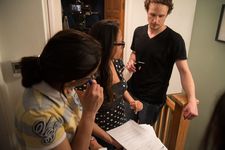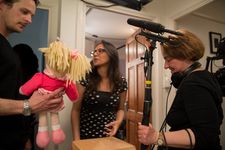 |
| Dr Nidhi Gupta |
What does the Covid-19 pandemic look like to those on the front line? Nidhi Gupta is a doctor who battled to save patients in acute wards in the early months of 2020 before coming down with the virus herself. She’s now putting together a film which will reflect on the lessons that can be learned from what took place so that we can do better the next time a major disease outbreak occurs. It involves situating the pandemic in its historical context, interviewing scientists and politicians from around the world and exploring the ways that we might now rebuild our society in a better way. This week she took some time out of her schedule so that we could discuss how her fundraising campaign has been going.
“It's been very slow,” she acknowledges – not a a big surprise at a time when many people’s finances are strained. “I don't think we're going to hit our target. I have to be honest about that.” She’s still positive, however, saying that it has given her team a chance to get to know each other before filmmaking starts, and it has also raised the profile of the project, attracting the sort of interest that could yet lead to larger scale financial support.
All donations are still helpful, she says, and when the current fundraiser closes in a few days’ time it will still be possible to donate through the film’s website. this will help with the practical side of the project. For her and her team, it’s not about the money.
“All of us are doing this as a labour of love because of our own personal experiences. And so for us, unlike a narrative film, there's a reason why we're doing this. We live in these unprecedented times, and it's about reflecting that. And so that's why everyone's working on it. We want to be part of this conversation. Which is also why the crowdfunding has been really useful and interesting because it has gotten the word out. People feel just so helpless. We wanted to actually find something positive out of suffering.”
I ask how her own experiences led her to develop the project.
“Even before this, I was a doctor and a filmmaker,” she explains. “I’ve been working part time for many years, kind of in both worlds. But when the pandemic started, in southeast London, where I work, we had some of the earliest cases, we got some of the highest numbers in the whole of London and the UK. And when the film world collapsed, because nobody could. I just basically just said ‘Where do you need me?’ Because of my special interest in medicine, I ended up on the Covid course I was basically doing shift after shift after shift. And unsurprisingly, I expected to get sick. You know, we all knew we were going to get sick. But I didn't expect to end up in hospital with it myself.
“I climb mountains. I walk 100 miles in a week, so I could expect to get sick but not, you know, nearly go into intensive care. I spent a week in hospital and I was off work for about a month. I'm still not 100%. I still get breathless doing things that wouldn't have made me breathless and I get very fatigued. So I have to balance what I do all day. I give myself regular breaks.
“In my recovery, I was reading about previous pandemics and despite my special interest in tropical infectious diseases, I realised I've never actually thought about this. I've got Master's in infectious diseases and we didn't have a single lecture on pandemics. I was reading all about this and I realised that we've been here before. This whole narrative that this could not have been predicted – that, you know, none of this was expected – when you look at the history, when you look at the research, it’s highly predictable. “If you look at 100 years ago to the last great pandemic – we have had other pandemics since, but the last great pandemic, the 1919 Spanish flu – which by the way, was only called Spanish Flu because Spain was neutral in World War One so it was the only one with a free press, so it was called Spanish flu although it had nothing to do with Spain... You know, there were debates about facemasks...
 |
| Nidhi at work Photo: Lloyd Jones |
“After World War One it was a catalyst for movements from oppression in Egypt in India and Korea, which completely echo and mirror Black Lives Matter today in terms of, you know, those problems didn't start with a pandemic, but they exacerbated what was going on. So people were like, ‘Wait, enough is enough. We still are not able to feed, clothe and educate our people. You know that that's not right. You know there's something wrong with the resilience in our system.
“ You know, over 20% of our economy disappeared overnight. When you look at South Korea, they didn't lock down, they had a robust system and their economy hasn't gone. They had the systems in place because the research was there. It's not like that here. Why don't we learn from our past experience? There's a famous quote from George Santayana in 1905, the philosopher, who said ‘Those who do not learn from history are doomed to repeat it.’ Hence the hence the name of the film – Start. Stop. Repeat - which is that we just seem to be getting, this endless cycle.
“So what can we do to learn from the current and past pandemics? After the Spanish Flu, it led to increased robust systems of public health and international cooperation, as well as catalysing freedom from oppression for quite a few people in different countries. We don't know what this pandemic will lead to, but what can we learn? When this happens again - it will happen, you will get another pandemic. That's the nature of ecosystem. What can we do to make sure we don't tank everything and that hundreds of thousands of people don’t die, people who either die from Covid today or from poverty tomorrow?”
A lot of what’s needed is education, she says.
“I've worked with over the world. I've worked with the World Health Organisation and if I didn't know about the pandemics, you know, as somebody who's studied and works in this area, well, how is any member of the public supposed to know? What do we need to do to get that information to the wider public?”
She’s also wary of narratives about getting everything back to the way it was before.
“There's there's a lot of kind of discussion about getting back to the new normal, getting back to pre-Covid times, and that wasn't that great for a lot of people. Nurses using food banks, you know, the highest rates of homelessness in a generation. A lot of people were suffering. Do we just want to go back to that suffering, you know, just because it's slightly less suffering?
“Public health, people's health, is not in opposition to a decent financial system. You can have a prosperous country and good health. You should not have to destroy your population to make money.”
Increasingly, we’re seeing celebrities going online with conspiracy theories about Covid-19, or straight out denying that it exists. There has been a longer trend of people suggesting that we shouldn’t listen to experts. Can her film help the public to understand where they should be putting their trust? .“I think there's been a deliberate undermining of that,” she says. “I also think we've not been good as a body in putting across our arguments. We're not very good at explaining uncertainty, you know, that it's not a simple yes, no answer, that it's a debate. It's an ongoing debate and discussion. Just because one scientist says this doesn't mean it's true. We are not a homogenous single body organism. It's a very disparate group of people from all around the world who all have their own agendas and views.
 |
| Start. Stop. Repeat. Photo: Lloyd Jones |
“There is a paper from 2015, so five years ago, which estimated that the global financial impact of a pandemic would be US$490bn. You know, it's not like this research didn't exist. But if you choose ideology over evidence based practice, then you're going to ignore that. And then why should anyone else why should the general public if the politicians are ignoring it?”
Can the film make these arguments more accessible to people who have struggled to make sense of what they’ve been being told?
“We're going to look at several aspects,” Nidhi says. “For example, when cholera was a major epidemic problem in London, famously, Jon Snow, all he did was remove a pump. He literally broke the water pump. Brilliant. Then cholera rates went down in the region about the pump and people understood that it was infected water. Something like that, I think, is quite an easy concept to get around in your head. If you can't explain it to somebody who isn't a scientist, then I think there's something wrong.
“But it's also about breaking it down. So we're going to look at aspects of public health, politics, freedom from oppression, media. And so by breaking it down into those individual aspects and telling the story, and then bringing it together at the end, it becomes a bit more manageable, more bite sized and more understandable.”
We discuss how this is a skill that she needs day to day as a doctor, helping people to understand their individual health problems
“The Venn diagram of medicine and filmmaking is a lot closer than you'd imagine,” she says. ”In terms of that and also things like managing people and organising a team. As a producer, my job is to manage a team. That's what it is. And that's what my job as a consultant is, I manage a team of people.”
It’s a skill she’s really going to need, as making a film in current circumstances is more complicated than ever.
“I want to go into production by the end of the year in terms of doing interviews,” she says. “What we're sorting at the moment is the logistics of filming, because it's not UK centric. This is a global story. We're talking about not just the UK, but countries like Korea and India. How do we film safely?
“I personally, as well as my team, we believe in sustainability, so we don't want to be flying around the world every other day. I don't think that's currently a safe thing to do and I wouldn't want to put my crew in danger that way. But also, they would have to self isolate for two weeks. So how do we interview people in a way that maintains my vision and then also have that connection?”
With people now talking about the pandemic beginning a second wave, she stresses the importance of social distancing and following the recommendations made for the different areas where we live, but she also stresses that people with other types of medical condition need to come forward to seek help even if they’ve been putting it off. She’s anxious not to see people get worse because they’re trying to reduce the burden on the NHS. The need to keep on providing services for everybody will be one of the topics in a film which, she hopes, can put us in a better position when we next encounter a new pandemic disease.
The crowdfunding campaign for Nidhi’s feature length documentary Start.Stop.Repeat is concluding on 15th September. You can support the project here.





















